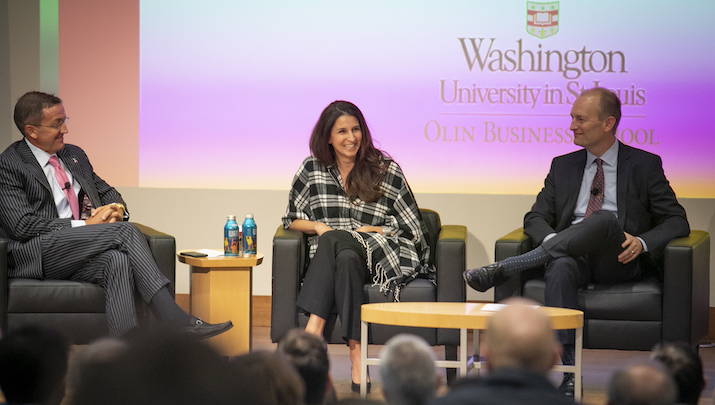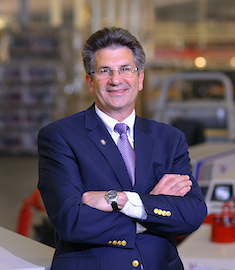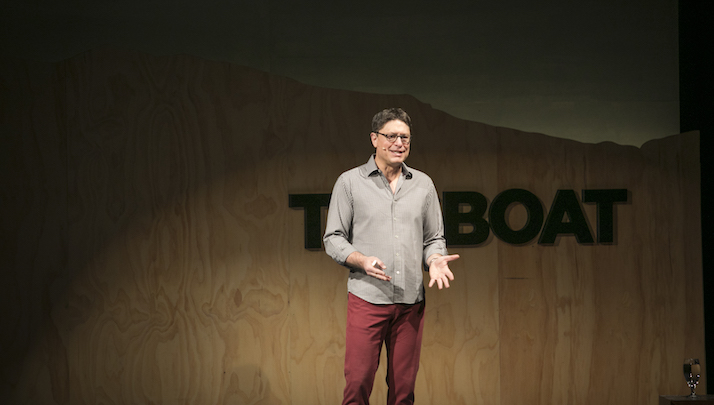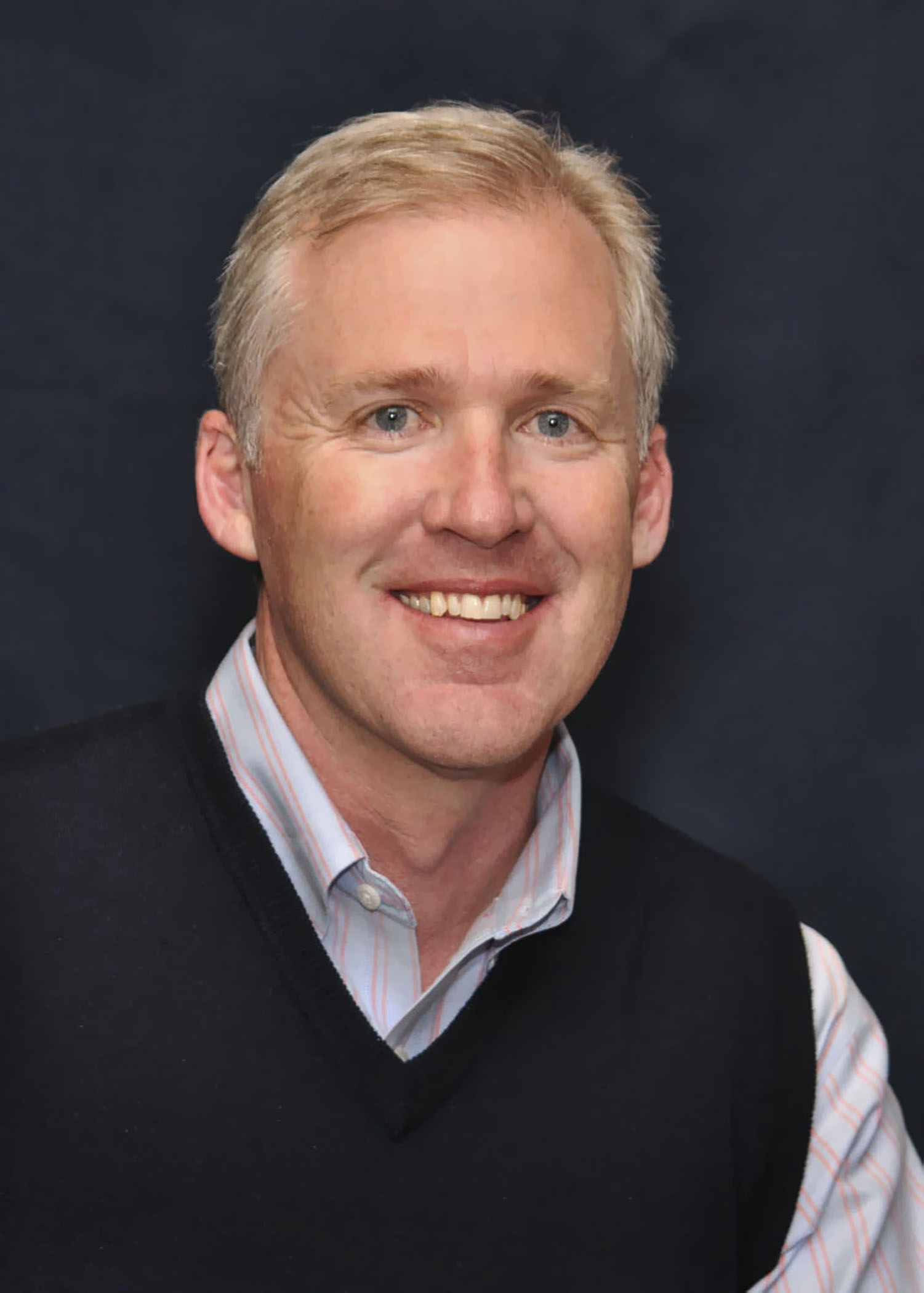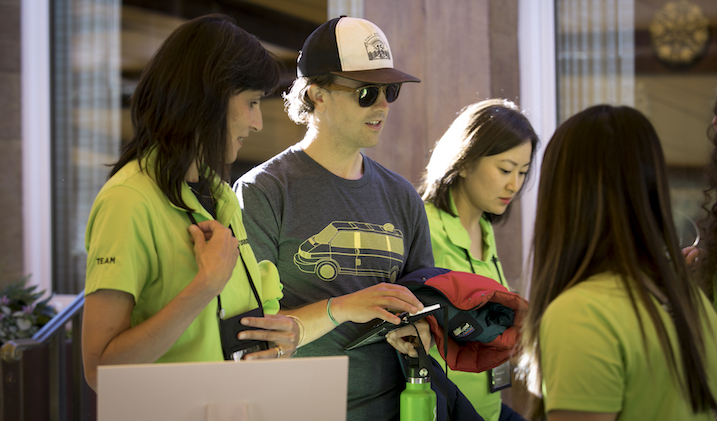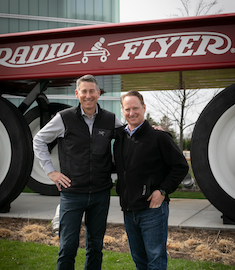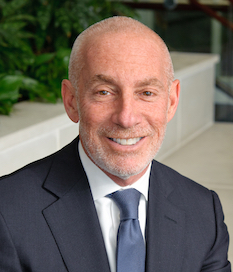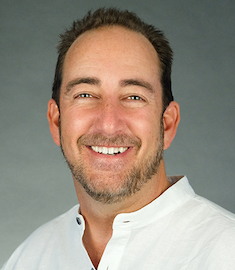The Importance of Evergreen Values in Business and Life
Why Evergreen? What key events or values lead a business owner or CEO to launch with or evolve to embrace the 7Ps that define the Evergreen movement?
In this panel discussion, presented at the Fourth Annual Olin Family Business Symposium at Olin Business School at Washington University in St. Louis in October 2018, three Tugboat Institute members describe their Evergreen journey and specific events and experiences that reflect their companies’ commitment to Evergreen principles.
Featuring: Jess Rovello, Michael Dierberg, Greg Twardowski, and John Stupp Jr.
The Act of Service that Changed Our Family’s Course
Our Evergreen company, Venture Products, has manufactured tractors and attachments in Orville, Ohio since 1998. But my family has had a much longer history in making tractors and other equipment from metal.
In 1922, my grandparents, John R. and Eliza Steiner, sponsored a Russian refugee, Henry Penner, to travel to Ohio from what is now southern Ukraine. They provided him with employment and housing so that he could become an American citizen.
Shortly after Henry’s arrival to the family farm, my grandparents learned that his passion was not for tilling fields, but, rather, for working with metal. To fuel his interest and continue to help him build a life and sustainable employment, my grandfather purchased tools and materials to set up a blacksmith shop. The forge, anvil, horseshoes, and other tools arrived via train to our local railroad station, and my family brought them home in a wagon.
Henry worked in that blacksmith shop for a year before moving to a neighboring town and opening an autobody shop, but metalwork continued to play a central role in the life of our family. My father, especially, was drawn to inventing and building with steel, and he merged his creativity and skill with entrepreneurial spirit to develop new farming equipment and processes. My six brothers and I learned the art of welding at the same time we were learning our ABCs, and we were encouraged to innovate and build throughout our lives.
As strong and essential as the foundation of metalwork in our family was a commitment to serving others. That decision to sponsor Henry Penner was one example of many acts of generosity and service in my grandparents’ and my parents’ lives. This commitment to helping others was deeply ingrained in our upbringing. My parents modeled this orientation continually; from opening our home daily to friends and strangers, to traveling nationally and internationally with us boys to help others in the wake of natural disasters and to serve ongoing needs in underserved communities. Service is part of our DNA, and it has also been a building block of our company.
In 1975, the year I graduated from high school, my brothers and I launched Steiner Corporation.In 14 years, the company grew into three divisions: turf equipment, agricultural equipment, and a community repair shop.Two of those divisions were sold in 1988.The Steiner Tractor line was sold to Ransomes, a British manufacturer of turf equipment. By 1996, the family’s vision and goals started to change, prompting the renaming of the company from Steiner Ag Products to Venture Products, Inc. Some of the first new products designed were focused on disability products for wheelchair users to simplify accessibility for transport. In 1998, we recommitted our focus on the next generation of all-wheel drive compact tractors, giving birth to the VENTRAC brand, "Your One Tractor Solution,” with over 40 attachments.
As we continue to build from the transformative and long-lasting legacy of steel and metalwork that has brought our family and our company to this point, we are equally aware of the parallel legacy of service and generosity as a core value of our company. We have developed a Heritage Principle to articulate this value: “At the end of the day, let this day be better because you were in it.”
In 2018, in celebration of Venture Products’ twentieth anniversary, we honored the legacy of service inspired by our grandparents’ sponsorship of Henry Penner when we built a tractor for YWAM, a youth ministry in Kiev, Ukraine. The organization operates on an eight-acre campus, and the tractor has become invaluable in the staff’s ability to manage snow, lawncare, and other property maintenance.
Though we participate in service projects throughout the year in our local area, this gift to an organization in the Ukraine was especially meaningful, given Henry Penner’s contribution to our family all those years ago. Perhaps most rewarding in considering the impact of this service project, was to see all of our employees embrace the effort. To see that thread of generosity and enthusiasm toward serving others stitch the company together was remarkable.
Whether through future projects in the Ukraine or in our backyard, I know that we will continue to engage in meaningful service work as a company. Not because it’s an annual company objective or a box to check, but because my family feels a deep responsibility to be of service. We wouldn’t be where we are today if not for the generosity of my grandparents and the ongoing work of my parents. Now, it’s our turn to continue to help our neighbors, in our own company, in our hometown, and in much more distant locales.
Dallas Steiner is CEO and COB of Venture Products, Inc.
Culture by Design
When Jay Wilkinson opted to attend a four-day leadership training course to earn credits he needed as a high school student, he had no idea it would transform his life. The CEO of Firespring says the experience was pivotal in his journey as an entrepreneur and in the award-winning culture he has built at his global integrated marketing, printing, and software company.
In this presentation from Tugboat Institute Summit 2018, Jay shares the story of his personal development, early business challenges, and the essential role that the Evergreen principle of People First plays in the success of Firespring.
Committed to Community
Our Evergreen business, High Plains Bank, is built upon a foundational belief that the civic and economic health of communities requires vibrant civic institutions from all sectors—public, non-profit, religious, and business.
Communities can achieve powerful goals when decision makers and residents from all sectors of a community come together. Working together makes it far easier to account for different interests, marshal unique resources, and build the social capital required to tackle tough community challenges. Remove one sector from this equation, and the work becomes profoundly more difficult.
This holds true for business-customer relationships, too. When customers have the opportunity to deal directly with decision makers, they are far more likely to find solutions to their unique needs and interests. Take decision makers out of the equation, and customers lose a significant level of efficacy. They are forced to fit in the business’ context.
Our commitment to support the vitality of our communities began more than one hundred years ago. Founded as the Flagler State Bank, in Flagler, Colorado, in 1908, my grandfather, Alex Creighton, became the bank’s cashier in 1920 and, together with his sons, bought control in the early 1960s. Members of all four branches of our family are still actively involved. We are explicit that our first goal is to make a lasting impact in our communities.
A focus on the civic health of our communities may seem strange for a financial institution, but we have found it to be a recipe for success. Now operating in four Colorado communities, we tailor our banking practices to the specific needs of each community. By necessity, many people in our communities operate multiple businesses. Others are both entrepreneurs and employees. We tailor our deposit products and lending practices to accommodate these circumstances.
In Longmont, where I live, we have a significant immigrant population. Working with an immigrant advocacy group, we learned that the cost to apply and take the test for U.S. Citizenship required a $900 up-front fee. This is beyond the reach of many aspiring citizens. We developed a low interest, unsecured loan to pay this fee. More than a dozen people are pursuing or have achieved citizenship through this offering, and we’ve never had a late payment.
Our community-centric approach also has a major impact on personnel policies, reflected in a saying we voice regularly: “Our secret sauce is that the bank is our third priority. Family and community come first.” Employees of our bank who are parents don’t have to use PTO to attend parent-teacher conferences or sporting events—schools and children come before work; we stop bank meetings when our employee-EMTs are called out on an ambulance run; and, employees who serve on public boards are encouraged to do so during business hours, as needed.
We don’t adopt these practices out of charity. Our shareholders have enjoyed nearly a 12 percent annual return over the past five years, and the bank has been growing by more than 11 percent annually over the same period. Nor do we take on these community-centric practices with a nostalgic desire to be a modern day George Bailey from A Wonderful Life. Our approach to banking is guided, in part, by community development research conducted by people like Vaughn Grisham, who completed longitudinal studies in Mississippi, as well as by the social science research I completed prior to my career as a banker.
As we continue to prioritize community, we learn from and are guided by personal experience. We have witnessed first hand how communities are handicapped when decision-making is stripped from local business. Smaller communities—the type with which we’re familiar—are struggling to learn how to replace the loss of leadership from newspapers, grocery stores, and funeral homes, among other businesses, which were once owned locally but are now often part of large corporations.
It is important to note that we are not so naïve as to believe a community-centric bank like ours can continue to operate in the future as we always have. We understand people’s expectations around how they manage money, payments, and finances in general are changing dramatically. We are investing more than we ever have—by three-fold—to respond to these changes and develop methods to be digitally trans-geographical. We are learning to help customers do things for themselves, around the clock, no matter their location. We will remain community-centric but we will also strive to build communities of customers who share our values beyond our traditional geographic boundaries. This work is in its infancy, and we’re excited to see where it leads.
Our ability to nimbly tackle challenges and remain relevant in a rapidly evolving industry also began decades ago. My father, uncle, and aunt (a pioneer for women in business), inculcated a deep sense of family loyalty, civic responsibility, and entrepreneurial spirit. As testament to their teachings, all four branches of our family remain actively engaged with the enterprise. We are beginning the intentional work of helping the fourth generation of our family understand the values of being stewards of a community institution.
My father and my uncle also insisted that employees be part of the ownership group. They formed an ESOP in 2003. Today, through the ESOP and individual ownership, our employees own more than 25 percent of the bank. Among the 70-plus Colorado chartered banks, we are aware of only eight that have ESOP programs (based on information provided by the Rocky Mountain Employee Ownership Center). When people ask us, “Are you like all the other banks? Are you for sale?” our reply is, “We’re already selling it to our employees.”
Our independence is one of the cornerstones of our long-term strategic plan. It would be far more difficult to pursue our community-focused approach to banking with a different ownership structure. Our aspiration is that this approach will continue long beyond our period of stewardship.
John Creighton is President and CEO of High Plains Bank.
What Do You Look for in an Evergreen Employee?
When Evergreen leaders seek employees for their Private, Purpose-driven companies, they are looking for team members who embody theEvergreen 7Ps. At Tugboat Institute Summit 2017 in Sun Valley, Idaho, our members described the traits they value most in their employees.
Featuring: Bryan Papé, Ross Evans, Jim Creel, Chip Dickinson, and Rick Sutton.
Lessons in Innovation and Integrity at Radio Flyer
There’s no question where you are when you arrive at the Radio Flyer headquarters in Chicago: the world largest wagon (actually—according to the book of Guinness World Records!) proudly stands in front of the entrance to the historic building, which was completely renovated in 2017.
Founded in 1917 by Italian immigrant Antonio Pasin, the iconic American brand thrives today under the leadership of Antonio’s grandson, Robert Pasin. As Chief Wagon Officer, Robert stewards the legacy of Radio Flyer, the leading maker of wagons and a wide range of other award-winning children’s products, honoring his grandfather’s vision, ingenuity, and generous spirit while growing the innovative, Evergreen business for the next 100 years.
Last week, Robert and the Radio Flyer team welcomed Tugboat Institute members for two days of learning during the Tugboat Institute @RadioFlyer exemplar event. Robert shared his grandfather’s inspiring journey and the company’s evolution, offered insight into the business and the family, and spoke openly about the challenge and reward of navigating his personal leadership journey.
In a Fireside Chat with Tugboat Institute Founder and CEO Dave Whorton, Robert noted his immense gratitude for the opportunity to continue to build the business Antonio founded, led by his values. “My grandfather was defined by his commitment to integrity—both in the products he created and in his personal relationships—and by his magnanimous nature,” Robert said. It’s that approach to family, business, and community that have guided Robert through difficult periods in his and the company’s trajectory and continue to guide the Evergreen leader today.
From that foundation, Robert’s personal commitment to excellence have led Radio Flyer to continually innovate award-winning products that honor the heritage of the wagon that launched the company while designing new products that delight and inspire children. Tom Schlegel, Chief Innovation Officer, offered members a deep dive into the strategy and product design that continue to drive the company’s success in their market—as well as candidly sharing the “failures” that provide essential lessons and opportunity for growth.
Members also gained invaluable insight into the award-winning People First practices from Amy Bastuga, Radio Flyer’s Chief People Officer. Over 11 years, Amy has worked closely with Robert to implement programs and practices that ensure employees love their jobs and are empowered, inspired, and happy. Amy’s presentation, which highlighted five key elements of the company’s people practices, offered tactical steps and emphasized the throughline of mission, vision, and values across talent acquisition, management, development, and engagement.
The presentations from Robert, Tom, and Amy were enhanced by opportunities on each day for members to process their learnings through small, working-group activities that connected participants to one another and to the content.
Members found further opportunity for connection with their Evergreen peers during “Best-of-Chicago” experiences. On Wednesday, the group toured at the Frank Lloyd Wright Home and Studio in Oak Park, a perfect follow-up to the day’s theme of innovation and design, followed by a fabulous meal at Chicago steakhouse STK. On Thursday evening, members gathered at the world’s premier comedy club and school of improvisation, The Second City. The group heard from Kelly Leonard, Executive Vice President of The Second City and author of Yes, And, who offered insight into how the “Yes, and..” approach to improv can transform conversation and thinking in business and leadership. Kelly’s presentation was followed by a meal at 1959 Kitchen & Bar in The Second City, during which several members shared their gratitude to Robert and the Radio Flyer team for the unique opportunity to step inside the business and learn from a company and a leader that so clearly exemplify Evergreen principles.
There’s no doubt that Tugboat Institute members left Chicago with innovative ideas, new and deeper relationships with their fellow members, and inspiration to take home to their teams, families, and communities. We are so grateful to Robert and his team for partnering with us to share best practices and to offer vital encouragement to our members on the Evergreen path.
Innovating for a Sustainable Future
It’s not uncommon to see a company’s purpose statement presented on a plaque in a lobby—sometimes even etched in brass or written in beautiful calligraphy and framed behind glass. While the presentation is impressive, the reality is that in many cases, when you venture past the lobby and speak to the people who work in the business, they sadly have no idea that the purpose exists or what it means to them.
In contrast, the Purpose at Michelman, a 70-year-old Evergreen company, where I serve as President and CEO, is central to every decision we make and the essential thread that weaves our global business together.
Michelman is a worldwide developer and manufacturer of environmentally friendly advanced materials, often helping customers through alternative and new technologies. We cross multiple industry sectors, including industrial and agricultural coatings, digital printing, consumer packaging, and advanced composites for automotive and aerospace.
Our Purpose, Innovating a Sustainable Future, reflects our commitment to solving big, intractable societal problems with sustainable technology through expertise and constant innovation.
I often say we are building Michelman for the fifth generation of stakeholders—many of whom haven’t even been born yet. As we have grown, I have found that we do our very best work when we are fulfilling our Purpose in a way that equally prioritizes people, profit, and planet. When we live our Purpose, we do it in a way that provides our associates with professional, personal, and career fulfillment (people), contributes to the sustainability and greening of the world (planet), while still earning us reasonable return (profit).
Here are a few examples of how we approach these three, equal priorities to find success as an Evergreen company.
People
As a leader and business owner, I have the opportunity and responsibility to positively impact and build relationships with Michelman’s associates and other stakeholders every day. I want our associates to feel that Michelman is more than a place of employment. We want them to find meaning in their work and be proud of what they do, as well as develop positive relationships with colleagues and clients. Our goal is to have them go home a little more fulfilled than when they came to work in the morning.
I believe that many of our associates have joined Michelman because of our Purpose of Innovating a Sustainable Future. This Purpose provides them with an opportunity to work toward something greater than themselves. Many of our associates continue to live this Purpose when they return home each day as they contribute to their communities and raise their families with kindness and consideration.
One of my favorite parts of my job is walking around the organization and checking-in with our associates. It energizes me to learn about their lives. By getting to know these associates, I can help them grow within Michelman, share personal insight, or simply listen to them when things are not going well. This interaction is one small way I engage our associates as the unique, interesting individuals they are.
We do our part to help our associates reach their full potential, which reflects our long-term commitment to them. We facilitate a number of “Leadership Accelerator” programs in which about 30 associates at a time, from a cross-section of our facilities and development centers around the world, attend a weeklong leadership development program that brings together all different work styles, cultures, and functions. Candidly, this is an expensive and time-consuming undertaking, but it reinforces the importance of our people and is an essential investment in the future leadership of this company, and in sustaining Michelman’s success for the long-term.
Planet
Michelman is in the solutions business. Chemistry is how we provide these solutions. We’re solving significant, interesting, industrial challenges with sustainable technology. We have a clear obligation to contribute to the sustainability and greening of our planet.
Our Purpose is at the heart of everything we do and is reflected in the environmentally conscious solutions we provide. Some of these include: developing sustainable technologies that allow packaging to be compostable, recyclable, or biodegradable for consumer product goods companies, and packaging and food manufacturers; working with glass and carbon fiber producers to help the automotive and aerospace industries develop stronger, yet lighter materials to help increase fuel efficiency; developing water-based technology to improve performance in paint and wood coatings for homes and decks.
Profit
The commitment to our people, planet, and long-term, Evergreen, outlook informs our approach to profit. While we are consistently quite profitable, there’s no doubt that we could make more money this year or next by ignoring people and planet. However, that wouldn’t align with our Purpose. We’re prepared to make less profit in the short-term to help solve hard problems. Because of this, we make significant investments into new technology and sustainability programs. These very long-term investments will help us to continue to address the big societal problems that affect our planet.
Our Purpose means we have to have a long-term view to build long-term value. This focus on long-term value creation not only guides our investment decisions but our divestitures as well.We have exited business segments because they no longer fit our Purpose.
No Tradeoffs
So what’s the tradeoff to prioritizing people, profit, and planet equally in the pursuit of our Purpose? Well, it’s not fair to say, “No tradeoffs.” The reality is that the tradeoff is time. Luckily, as an Evergreen company, we have time. We have the luxury of making decisions based on these priorities because we are investing and building for generations to come. We may not see the immediate, measurable benefits of the decisions we make this year or, in some cases, even in our lifetime. However, we will continue to make choices based on our values and according to this philosophy because we genuinely believe in our Purpose of Innovating a Sustainable Future and the opportunity it offers to do good and treat people well.
Steve Shifman is President and CEO of Michelman.
A Rebel with a Cause
I’ve always liked to upset the status quo. As a kid, I often found adults in authority to be cringeworthy.
My entrepreneurial journey is defined by a desire to fling a solution in the face of authority. Tell me that something can’t be done, a problem that’s too messy to solve, and I’ll find a way.
In 1998, I was running an educational software company that I had cofounded, and I found myself in conversation with a teacher. I asked her if she used email to communicate with her students, to which she replied, “Oh, no, my district would never let kids have an email account.” As the owner of a business that wouldn’t exist without email, I had to ask the “why” question—that’s what entrepreneurs do.
The teacher’s response: “It’s too risky. We can’t manage the safety and security concerns; we won’t be able to monitor who the kids are talking to or handle potentially unsafe behaviors that might be hatched online.” The concern was valid, but so were the benefits of students using email. They should have access to the same essential tools as adults. I could solve this problem.
In the 20 years since that conversation, I grew my Evergreen business, Gaggle, from what was originally a safe student email system, a “Hotmail for kids,” to a comprehensive learning management system for schools. As the platform evolved, it became clear that it was the safety component of our product that drew interest from most schools. Our core offering is now a software and people solution that sits behind systems like Google Apps for Education or Office 365. We monitor email and documents for suspicious terms or images to ensure students’ safety.
Student safety and wellness have become our Purpose.
The data from schools reflects the essential role Gaggle now plays in keeping kids safe. In 2017, our safety team alerted schools to 17,000 suicide references. Those instances are in addition to thousands of other flagged communications relating to everything from weapons to fighting to bullying to pornography to drug abuse and physical abuse at home. Our team monitors those communications 24/7, alerting schools to credible threats and serving as an early warning system for potentially dangerous situations. It’s our mission to identify the worst-case scenario and prompt intervention.
That intervention has saved the lives of students. In one stark example, we alerted a school about a young woman’s intention to take her own life. The alert resulted in a school resource officer rushing to the bathroom to find that student within about a minute of her death.
It’s heartbreaking to witness the scope of the mental health crisis affecting students. Kids are suffering with anxiety and depression at alarming rates. They’re scared; they’re lonely; they don’t know who to talk to. They’re embarrassed. They desperately want someone to hear them, to care. It’s heavy.
Our team recognizes the enormity of the responsibility we have as providers of what is a life-saving technology. The men and women who serve as safety representatives at Gaggle are on the front lines, and their commitment to our Purpose is relentless. That level of care is evident across our company.
The gravity of our Purpose is a blessing and a curse. We currently protect four million students in the U.S. But I can’t help but worry about all of the students who are not being heard, whose messages are not being flagged, whose schools aren’t being alerted. That concern propels our team to grow the business and bring our safety solution to more schools. We are driven to expand the Gaggle lifeline to cover more kids. Our goal is to protect 10 million students through our platform in the next four years.
As our Purpose drives our growth, it also propels my personal and leadership development. I’ve been an entrepreneur my entire life, and my desire to rebel against the status quo continues to fuel my journey. Now, guided by Purpose, my ability to solve a difficult problem seems more important than ever. If the dire challenges that students are facing today are the new normal, I look forward to continuing to ask the tough questions and provide solutions.
Jeff Patterson is the CEO of Gaggle.
Purpose Uncapped
I’ve always had an entrepreneurial spirit. Growing up in Mexico, I took our family’s annual trip to the U.S. as an opportunity to invest in a suitcase full of American candy. I would then resell the American treats to friends back home. It was a time when the quality and design of products manufactured in Mexico was poor, and my classmates were hungry for anything made in the U.S.A. I made a fortune, and the experience opened my eyes, at an early age, to the draw of quality goods.
I didn’t know it then, but that may have been my first step toward building a luxury brand.
My candy selling endeavors were followed by another significant early adventure in business. When I was 15, my father lent me some money to open a small taco shop. It was very hard to run a business when I was so young, and I left after one year, but it taught me important lessons. My father wanted me to understand the importance of hard work, of continually seeking to better myself, and the value of honesty and family.
Those values served me well when in 1997—without knowing anything about the industry—I launched my first spirits product, La Pinta, a pomegranate-tequila punch. I had done the research to know that nobody else was making the product, which was based on a local punch, La Ponche Granada, but I learned quickly that it wasn’t enough to have a delicious, high-quality product—I needed marketing power and business acumen to make it a successful endeavor. It was humbling to recognize all that I didn’t know, but it was also the first of many opportunities to be open to learn and transform to move forward—keystones of my journey as an Evergreen leader.
In the wake of that experience, I pursued a master’s degree in marketing and trained to become a Master Distiller. That learning journey led to my developing Tequila Clase Azul Reposado, ultra-premium tequila, the first of what has evolved to become our line of 10 tequila products. In 2002, my ex-brother-in-law, Juan Sanchez, who had earned his MBA in the U.S., partnered with me, bringing a deep understanding of U.S. culture and opening our U.S. importing company, which was a milestone.
The years that followed were a period of expansion and challenge, as we learned to navigate the spirits industry, seeking our niche. We made a lot of mistakes in those early years, as we tried to fit ourselves into an industry dominated by huge, multinational corporations, but each challenge ultimately led us to a better product and helped me develop as a leader.
First, our original bottle design proved problematic, as the top of the bottle was flat, which made it hard to pour the tequila without making a mess. We redesigned the bottle and created a smaller opening at the top and a tighter lid, which kept the tequila super fresh and made it easier to pour. Not only did the new design please our clients, but this evolution is what led to our magical caps, which make a ringing bell sound when you tap them in just the right way. We like to say the sound signifies the unleashing of the magic of what’s inside.
Second, my naivete about the spirits industry, as well as the business climate in the U.S., combined with my underdeveloped English created a steep, strenuous learning curve. As I worked to fine-tune my English and to understand the industry, I spent a lot of time trying to find help and guidance from outside sources, which was really difficult in such a competitive industry.
Finally, I was struggling to identify our purpose as a brand. Why did we matter? What would happen if we disappeared? Would our absence have any kind of impact?
In 2005, we were forced into a period of transformation that, while difficult, ultimately allowed us to answer those questions and define the brand we are today. When a hurricane destroyed Cancun, eliminating the market for what was then 40 percent of our product, the need to replace those accounts led us to Los Cabos. Entering that market, we came to truly understand luxury and the potential for our product in that space.
To make our place among the big players in that landscape of high-end resorts, we were forced to explain our unique offering and had the opportunity to share the values of Mexican culture through our product. After stumbling in an industry that seemed to overwhelm us, we did something right: we fell in love with our culture, and we reflected our authentic passion for our roots in our product and artisan packaging, recognizing the potential for our disruptive, unique offering in the industry.
This experience answered the big question: We learned why we matter.
As we developed our brand identity and found our place in the luxury market, I embarked on a parallel journey of self-discovery that allowed me to grow as an individual and an Evergreen leader. A spiritual trip to Tulum sparked a new awareness that I had been leading my personal life in a way that I began to recognize was unhealthy and superficial. I had not been making the smartest choices in my personal or my business life because I wasn’t tuned into cause and effect in either sphere. I started to become really aware that my leadership of the company was deeply connected to our ability to deliver on strategy and move forward, and my ability to lead was being impeded by tendencies to embrace the superficial and material.
If I wanted to be an example to my team, I had to lead by example and align myself with the vision of the company. Suddenly every choice I made in my personal life was significant, and I started listening to my heart and soul as opposed to my gratuitous desires. I realized that by adjusting some of my less-positive habits or routines, I would open up a more positive and productive space to do things that would benefit my clients, my employees, and my loved ones.
My spiritual journey ignited my understanding of leading with Purpose. I now recognize that any success a business experiences is due to the people who embody the Purpose and vision of that company. As I have grown and evolved personally, I’ve learned to understand, respect, and empower myself enough so that now, as a leader, I can offer that same respect and opportunity to others, creating a profound level of happiness for our team and success for our brand.
As we look ahead to the new, expansive opportunities our company is pursuing today, I am again entering into a period of learning, ready to embrace further growth. With plans underway to expand our brand into the luxury hospitality space through Clase Azul tasting rooms and a boutique resort now in development, I am returning to school to study toward a master’s degree in European Luxury Management. I’m ready to embrace the new experiences ahead and to help lead our company into another new chapter. I know that there will, again, be challenges in entering into a new industry, but my path has shown me that where there is challenge, there is opportunity for meaningful personal and professional development.
Arturo Lomeli is Founder & CEO of Clase Azul.
The Enduring Advantage of Strategic Ownership
In this panel discussion, presented at the Fourth Annual Olin Family Business Symposium at Olin Business School at Washington University in St. Louis in October 2018, Tugboat Institute members Alaina Macia and Penny Pennington offer insight into their companies’ approaches to ownership and leadership through the Evergreen lens. Alaina offers the perspective of assuming leadership in and growing her family business, MTM Inc., while Penny, Managing Partner of Edward Jones Financial, shares insights around leading a nearly-100-year-old firm. These inspiring Evergreen leaders speak to what it takes to steward strategic ownership and thrive in the long term.
